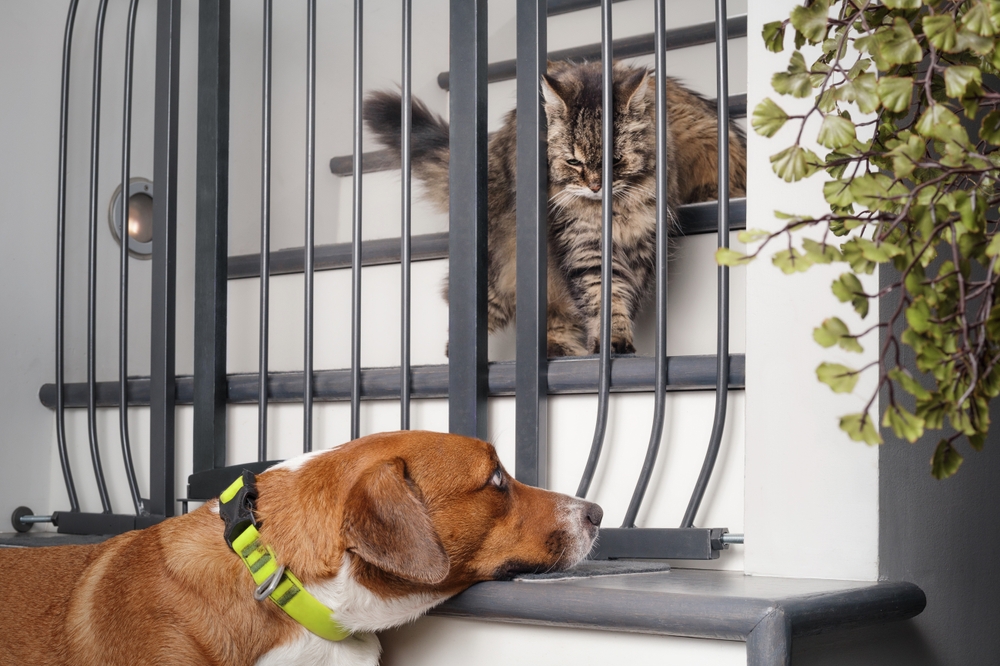A pet owner’s primary goal is to keep their furry pal safe, but accidents and illnesses happen. Understanding what causes pet emergencies can help you prepare for and prevent the most common scenarios. The Star of Texas Veterinary Hospital team provides an overview of the most common emergent pet conditions, how to handle a pet emergency, and tips for keeping your pet out of the ER.
Common pet emergencies
Understanding emergencies your pet may face is the first step in prevention. Here are some of the most common scenarios that could threaten your pet:
- Poisoning—Many household substances, including chemicals, certain foods, plants, and medications, are toxic to pets.
- Trauma — Common traumatic events include being hit by a car, falling from furniture or a caregiver’s arms, or fighting with other animals.
- Difficulty breathing — Choking, respiratory infections, heart problems, allergic reactions, and toxins can make breathing difficult.
- Allergic reactions — Reactions to insect stings, drugs, vaccines, or other allergens can be mild, or severe and life-threatening.
- Blocked cat — Male cats are prone to life-threatening urethral blockages that prevent them from urinating.
- Bloat — Common in large-breed dogs, bloat is the result of the stomach filling with air and twisting on itself, which requires emergency surgery.
- Foreign bodies — Pets who swallow indigestible objects, such as toys, clothing, or rocks, can develop an intestinal obstruction and require emergency surgery.
- Seizures — Epilepsy, toxins, metabolic disorders, and brain diseases may cause seizures. More than one seizure or a single prolonged seizure is considered an emergency.
- Heatstroke — Pets left in vehicles or who exercise in the heat can develop life-threatening heatstroke.
- Vomiting — Persistent vomiting that doesn’t respond to food being withheld or a bland diet can lead to dehydration and may indicate a serious underlying disorder.
What to do in a pet emergency
Staying calm and acting quickly is crucial to successful emergency care and treatment. Here’s what to do if your pet needs emergency care:
- Assess the situation — Objectively evaluate your pet’s condition to decide if immediate care is necessary.
- Administer first aid — Stabilize your pet by applying first aid techniques you can learn in online or in-person classes, such as those the American Red Cross offers.
- Seek care — Call our team for advice and to let us know you are en route with an emergency. After hours, contact the nearest emergency hospital.
- Transport safely — Move your pet carefully to avoid further injury. Use a blanket as a stretcher, and remember that injured or stressed pets may bite. If possible, ask a friend or neighbor to drive, so you can sit with your pet.
Top tips for preventing pet emergencies

Strategies to help you ward off the most common pet emergencies include:
- Pet-proofing your home — Keep toxic substances, small objects, dangerous foods, and medications out of reach. Confine pets to pet-proofed rooms only, especially overnight or while you are away.
- Monitoring your pet — Watch your pet during playtime, in the yard, and on walks to ensure they do not encounter something dangerous. Keep dogs on a leash while exploring.
- Scheduling regular veterinary visits — Regular health screenings can detect concerning issues early, facilitating treatment before they become emergencies.
- Investing in pet training — Basic commands, including “Come,” “Stay,” and “Leave it,” can help keep pets from dangerous situations. Crate training is also invaluable for keeping pets out of trouble.
- Practicing exercise and heat safety — During hot weather, ensure your pet can access shade and water and avoid excessive exercise outdoors. Never leave pets unattended in a vehicle.
- Skipping the dog park — While the dog park offers excellent socialization opportunities, it is also a breeding ground for parasites and sets the stage for fights if pet owners can’t read their dogs’ body language or control their behavior. Daycare facilities can provide a supervised, controlled socialization experience.
Many of the most common pet emergencies are preventable when you understand how and why they occur. Regular visits with our Star of Texas Veterinary Hospital team form the basis for your furry pal’s health and help prevent minor illnesses from becoming emergencies. Still, accidents happen, and your pet may need emergency care. Contact us to schedule your pet’s next routine visit or with urgent or emergency health concerns.






